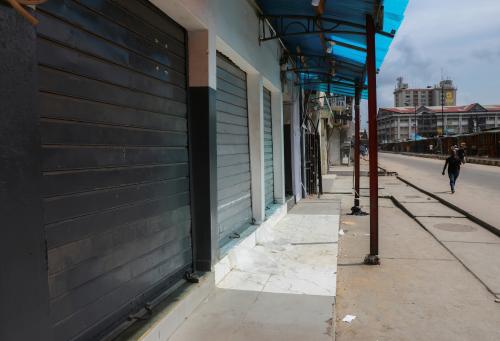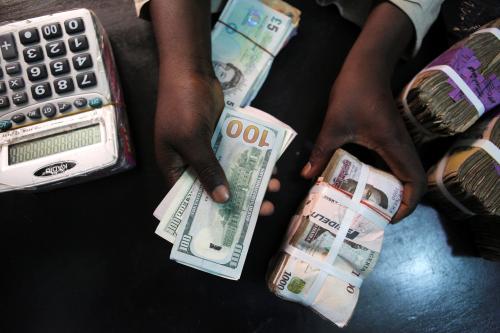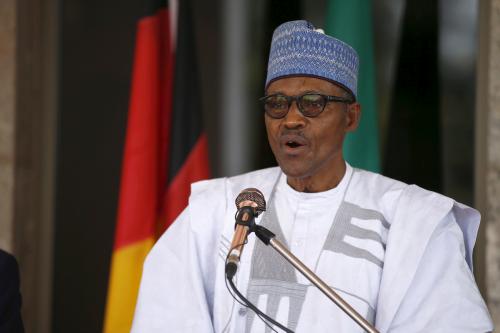This blog previews and discusses one of the top priorities for Africa in 2016 as shown in Foresight Africa 2016.
Read the full report here,
which covers other critical issues affecting the continent. You can also watch video or listen to audio from our annual Foresight Africa event.
Nigeria—Africa’s largest economy and its most populous nation—is feeling the full brunt of a falling oil price. The value of the commodity has fallen by more than 65 percent since mid-2014 from $112 per barrel to less than $39. Such a decline is a significant negative shock for a country that typically derives two-thirds of its government revenues from oil. How will Africa’s giant react to this shock in 2016?
President Muhammadu Buhari’s 2016 budget proposal charts the course for Nigeria in the next three years to not only manage the current external economic turbulence but also set the stage for strong, sustainable, and inclusive growth in the medium-term.
What are the key objectives of the 2016 budget?
By ramping up infrastructure spending, reducing existing inefficiencies public expenditures, raising non-oil revenues, and fighting corruption, Buhari’s 2016 budget seeks to stimulate economic growth, increase competitiveness, and improve human development. There is a clear objective to diversifying the Nigerian economy and using the expected economic gains to increase the welfare of Nigerians, including by reducing youth unemployment and extreme poverty. (For a great visual breakdown of the budget, see here).
How does the government plan to meet them?
- Spending on infrastructure and human development to stimulate the economy: The government intends to increase capital expenditure as a share of total budget to more than 30 percent from 15 percent. Infrastructure spending is expected to revive economic growth and help create jobs in a number of sectors such as agriculture and mining. The government intends to also spend resources in education, health, and security to foster human development. Tax rates for smaller businesses will be lowered, and priority sectors such as agriculture and solid minerals will be subsidized. On the education front, unemployed graduate teachers will be recruited, trained, and deployed in public schools. In partnership with state and local governments, financial training and loans will be provided to market women, traders, and artisans through their cooperative societies. In partnership with development partners, conditional cash transfer programs are envisioned for the poorest and most vulnerable segments of the population.
- A lean and cost-effective government: Spending more is not the only way to have an impact, and the budget rightly emphasizes the need for a “lean and cost-effective government” by targeting efficiency losses associated with the current budget and public expenditure framework. It will enforce the Fiscal Responsibility Act requirement for ministries, departments, and agencies (MDAs) to present their budgets in advance and remit their operation surpluses. In a departure from the previous budgeting approach under which only incremental expenditures have to be justified, a zero-based budgeting approach will also be implemented. The new Efficiency Unit will seek to reduce inefficiencies in spending, and the government will keep a close eye on personnel and pension costs, including through a new continuous audit process and the extension of the integrated personnel payroll information system.
- Raising non-oil revenues: The government hopes to increase non-oil tax revenues by 20 percent in 2016 by expanding tax collection. Beyond improving domestic revenue mobilization, the hope is that the expansionary fiscal stance will help generate growth in the non-oil economy, which then can be taxed. Although the government will not increase the value-added tax rate—one of the lowest in the world—it plans to free up resources by removing fuel subsidies, a politically courageous initiative.
- Fighting corruption: Buhari has clearly indicated his resolve to fight corruption and has replaced the heads of revenue generating agencies, including at the Nigerian National Petroleum Corporation (NNPC). He also plans to recover misappropriated funds to help supplement fiscal revenues. The budget also plans for the implementation of a Treasury Single Account to increase transparency in and improve the remittance of collections of revenues.
What are the risks to achieving the objectives?
The new budget is consistent with the “new normal” in international oil markets and assumes a lower benchmark oil price of $38 per barrel down from $58 in the 2005 budget (together with reduced production).
As all planned expenditures (N6.08 trillion, or about $34.5 billion using the official exchange rate) will not be covered by expected revenues (N3.86 trillion), the budget forecasts a federal fiscal deficit of N2.22 trillion in 2016. This is equivalent to 2.2 percent of GDP and is twice the 2015 figure of 1.1 percent. This begs the question of how the deficit will be financed. The budget plans for a blend of new domestic (N984 billion) and international (N900 billion) borrowing totaling N1.84 trillion, which would be complemented by the recovery of misappropriated funds.
Some budget assumptions can be questioned: Will the government be able to raise non-oil revenues (corporate tax, VAT, customs and excise duties, and federation account levies) to the level of N1.45 trillion or 38 percent of total revenue? Will it be able to raise an additional N1.51 trillion by enforcing the Fiscal Responsibility Act? Slippages on the revenue side will translate to a larger than expected budget deficit and higher financing needs.
One issue that would be worth clarifying is the impact of a naira depreciation on the budget. Today, the exchange rate in the parallel market is at least N264 per dollar, indicating some overvaluation of the official rate (34 percent using the difference between the two rates but of course there are other ways to assess an overvaluation, which I will not go into here). At N197 per dollar, the current official exchange rate that is assumed in the budget reflects the government’s use of administrative measures to stem the depreciation of the naira. My sense is that this reflects Buhari’s concerns of the impact of higher inflation on the population. The price of imported goods such as food imports would go up if the naira depreciates. Difficulties in obtaining U.S. dollars are increasing the cost of doing business and have led to Nigeria’s removal from two benchmark bond indices (JP Morgan and Barclays).
The budget recognizes the impact of the U.S. dollar shortage on the Nigerian economy. Buhari stressed that he is aware of the problems traders, business operators, manufacturers, airline operators, and the financial services sector are facing. But is not clear what the proposed solution for the Central Bank to “fine-tune its foreign exchange management to introduce some flexibility and encourage additional inflow of foreign currency” entails.
Given the current level of foreign exchange reserves ($29.5 billion in mid-December) and the shrinking dollar export revenues coupled with the likely increase in imports associated with the stimulus, it is not clear how long the Central Bank can resist market forces and continue to rely on foreign exchange management.
It would be wise to revisit the budget in a scenario that includes a naira depreciation. On the one hand, a depreciation would increase naira-denominated oil export revenues (the pass-through should be close to one). On the other hand, debt servicing costs would increase. But given the fact that about two-thirds of total revenues are derived from oil exports, the resulting fiscal deficit may be lower than the one in the 2016 budget. A depreciation may also help revive or increase foreign investment. Uncertainty about the future path of the naira is leading investors to adopt a wait-and-see attitude and postpone their investment decisions.
How about the impact on food and other prices? Well, if the current parallel market exchange rate is extensively used by economic agents, prices may already have adjusted. The government can find ways to compensate the poorest segments using some of the increase in oil revenues associated with a depreciation. However, segments of the private sector that rely heavily on imports would face higher costs from a depreciation (although the pass through may be less than one). I guess my point is that it would be useful to get a clearer picture of the impact of a depreciation on the budget figures, including the likely impact on the overall economy. This would help ensure the consistency of exchange rate, fiscal, and monetary policies.
Overall, however, it is difficult to disagree with Buhari’s roadmap. The 2016 Nigerian budget provides a useful template for African countries. This is the leadership that we expect from the country.
Read
Foresight Africa 2016
, which details the top priorities for Africa in the coming year, to learn more about how African might mitigate external economic shocks as well as other critical issues for the region.





Commentary
Foresight Africa 2016: President Buhari’s budget sets the right course
January 6, 2016